Growing Up Bad: Black Youth, Road Culture and Badness in an East London Neighborhood » książka
Growing Up Bad: Black Youth, Road Culture and Badness in an East London Neighborhood
ISBN-13: 9781872767031 / Angielski / Miękka / 2010 / 163 str.
The 'problem' of young black men has loomed large in the news-media and academic research for more than forty years, highlighting and exacerbating moral panics about mugging, rioting, drug-dealing, knife and gun violence and much more. Young black British men feature in any descriptions of social alienation and discrimination, seen as suffering more than most in any measure of poverty, mental illness, school exclusions, educational under achievement and experiences of the youth justice system including imprisonment. For some commentators poverty and institutionalised racism are the root causes for this continued social marginalisation. In contrast other writers play down such interpretations, placing the blame on an urban black male youth culture, influenced by black American and Jamaican popular youth cultures, that is anti school and obsessed with the violence and hyper-masculinity of the street. Both positions tend to stereotype all young black males as belonging to a larger homogenous group. This book is based on an ethnographic study of young people undertaken in an East London neighbourhood. It provides a counterweight to the stereotype of 'dangerous' and 'underachieving' young black men. The focus is on young people aged between thirteen and twenty-one in an examination of the role of contemporary youth subcultures on the transitions and everyday life experiences particularly, but not exclusively, of black British Caribbean young men. The significance of home life, schooling, spatial locality, ethnicity and gender is explored providing a more nuanced and holistic understanding of the young participants' everyday lived experiences. Anthony Gunter is a senior lecturer in criminology at the University of East London, UK. Before he worked for more than ten years in East London with young people as a detached youth and community worker and Project / Area Manager.
The problem of young black men has loomed large in the news-media and academic research for more than forty years, highlighting and exacerbating moral panics about mugging, rioting, drug-dealing, knife and gun violence and much more. Young black British men feature in any descriptions of social alienation and discrimination, seen as suffering more than most in any measure of poverty, mental illness, school exclusions, educational under achievement and experiences of the youth justice system including imprisonment. For some commentators poverty and institutionalised racism are the root causes for this continued social marginalisation. In contrast other writers play down such interpretations, placing the blame on an urban black male youth culture, influenced by black American and Jamaican popular youth cultures, that is anti school and obsessed with the violence and hyper-masculinity of the street. Both positions tend to stereotype all young black males as belonging to a larger homogenous group.This book is based on an ethnographic study of young people undertaken in an East London neighbourhood. It provides a counterweight to the stereotype of dangerous and underachieving young black men. The focus is on young people aged between thirteen and twenty-one in an examination of the role of contemporary youth subcultures on the transitions and everyday life experiences particularly, but not exclusively, of black British Caribbean young men. The significance of home life, schooling, spatial locality, ethnicity and gender is explored providing a more nuanced and holistic understanding of the young participants everyday lived experiences.Anthony Gunter is a senior lecturer in criminology at the University of East London, UK.Before he worked for more than ten years in East London with young people as a detached youth and community worker and Project / Area Manager.











